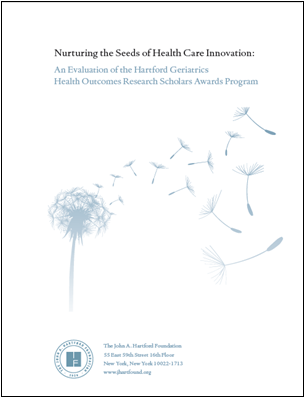 Over the past 30 years, the Hartford Foundation has invested significant resources to build the geriatric health care workforce and to show how we as a society can organize our talents and resources to improve the health care of older adults. Today, I am pointing my spotlight on the career development of young physician-scientists who serve as a bridge between academics and practice. Career development can be a complex and surprisingly uncertain process. Even the careers of the most talented professionals begin as vulnerable seedlings, and all need nurturing.
Over the past 30 years, the Hartford Foundation has invested significant resources to build the geriatric health care workforce and to show how we as a society can organize our talents and resources to improve the health care of older adults. Today, I am pointing my spotlight on the career development of young physician-scientists who serve as a bridge between academics and practice. Career development can be a complex and surprisingly uncertain process. Even the careers of the most talented professionals begin as vulnerable seedlings, and all need nurturing.
It gives us great pride to announce the release of the Foundation’s evaluation of the Hartford Geriatrics Health Outcomes Research Scholars Awards Program. The award provided early-stage funding for young physician-scientists actively pursuing the knowledge that our nation needs to transform how health care is practiced, delivered, and distributed to older adults. By all accounts, the award came at a pivotal moment and provided a stepping stone that enabled each Scholar to achieve greater recognition and prominence. Although the program selected its fifth and final cohort in 2009, the careers of all 20 Scholars are indelibly marked by their participation.
As the report shows, the program has accomplished its desired impact on the Scholars’ research careers. All 20 Scholars continue to pursue careers in geriatric health outcomes research. Their achievements during and after the program have been exceptional. The vast majority increased their output during the program, including publishing a total of 251 peer-reviewed journal articles, 26 literature reviews, 29 book chapters, and nearly 300 presentations. They have earned significant awards, promotions, and recognition as well as media attention.
The Scholars’ success in the arenas of continued research funding and promotion is also impressive. All of the Scholars report securing additional federal and/or private funding. Thirteen have received the prestigious Beeson Career Development Award. The Scholars are also advancing in tenure-track professorial positions, including four who have already been promoted in rank to the Associate level. In total, these Scholars have secured approximately $15.5 million in additional funding!
Most of our readers will not be surprised to read that with the aging of our population, the demand for geriatric health outcomes research is destined to grow. The logic of that is clear, but its importance cannot be overemphasized. Health outcomes research is vital to the development of practices and interventions that we need to improve health, to enhance the quality of care, and to control costs. Congress recognized the fundamental importance of this research with the passage of the Affordable Care Act, which authorized the creation of the Patient-Centered Outcomes Research Institute (PCORI), an independent entity that will conduct health outcomes research.
The Scholars we have nurtured are uniquely positioned to fill the need for quality health outcomes research that can guide the evolution of our health care system. Moreover, their shared effort to integrate geriatrics into education and research comes at a critical time for the nation’s rapidly increasing population of older adults. Collectively, their contributions offer the potential for better-informed health care policy and a better-designed healthcare system.
As the Health Outcomes Research Scholars progress in their careers, their influence on academic medicine and delivery of actual care will only grow. As the nation faces what has been called an existential threat from the combination of growing health care costs and an aging population, we share the lessons of this program to inform other decision makers about the value and impact of providing support for the professional development of scholars at the forefront of geriatric health outcomes research.
